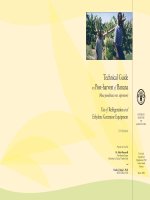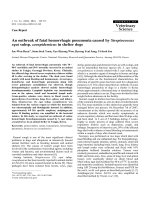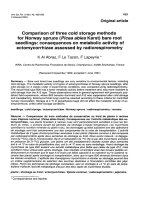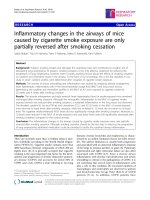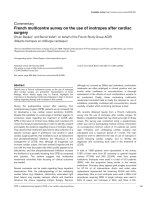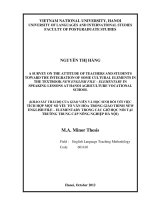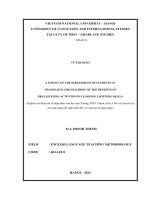Survey on tip-over disease of Banana caused by Erwinia carotovora subsp. Carotovora (Jones) holland in Parts North Eastern Karnataka, India
Bạn đang xem bản rút gọn của tài liệu. Xem và tải ngay bản đầy đủ của tài liệu tại đây (139.88 KB, 4 trang )
Int.J.Curr.Microbiol.App.Sci (2017) 6(6): 2973-2976
International Journal of Current Microbiology and Applied Sciences
ISSN: 2319-7706 Volume 6 Number 6 (2017) pp. 2973-2976
Journal homepage:
Original Research Article
/>
Survey on Tip-over Disease of Banana caused by Erwinia carotovora
subsp. Carotovora (Jones) Holland in Parts North Eastern Karnataka, India
V. Thiyagarajan1*, S.T. Yenjerappa1, Gururaj Sunkad1, D.S. Aswathanarayana1,
V. Karuppaiah2 and H.M. Shaila1
1
Department of Plant Pathology, College of Agriculture, Raichur, University of
Agricultural Sciences, Raichur, India
2
Directorate of Onion and Garlic Research, Pune, India
*Corresponding author
ABSTRACT
Keywords
Bacterial disease
in banana, Musa
spp tip-over
disease, Erwinia
carotovora.
Article Info
Accepted:
29 May 2017
Available Online:
10 June 2017
Tip-over disease in Banana is an important bacterial disease caused by Erwinia carotovora
subsp. Carotovora. The disease cause severe yield loss in banana particularly in tissue
cultured plantations. A roving survey was conducted to assess the severity of tip-over
disease of Banana in the farmer’s field of north eastern Karnataka. Survey reported highest
disease incidence (20.35 %) at Muddaballi village of Koppal district. The least incidence
(1.15%) was recorded in Ankammanahal village of Sandur taluk of Bellary district. Taluk
wise mean incidence revealed that, highest disease incidence of 17.92 per cent was
recorded in Koppal followed by Shimoga (12.0%), Gangavati (8.07%), Holalkere (7.8%)
and Sagar (6.30%) taluks. The minimum incidence of 1.75 per cent was recorded in
Sandur, Hospet (4.69%), Hiriyur (5.7%) taluks. District-wise, highest tip over incidence of
12.99 was recorded from Koppal followed by Shimoga (9.15%) and Chitrdurga (6.75%).
Lowest incidence of 3.22 per cent was recorded in Ballari district of Karnataka. The
survey revealed that, occurrence of Erwina carotovora in Banana varies with locations.
Introduction
Banana (Musa spp.) is one of the oldest
cultivated tropical fruit crops of India. It was
known from the time immemorial as cheap,
plentiful and most nourishing among all the
fruits. Banana is generally grown throughout
the country round the year. It is not a season
bound crop and can be grown well under
humid weather conditions. Several factors are
attributed as constraints for successful
production of banana and major being the
occurrence of diseases. Banana is subjected to
many serious debilitating diseases caused by
fungi, viruses, bacteria, nematodes and nonparasitic agents.
Among the bacterial diseases, tip-over or
bacterial rhizome rot caused by Erwinia
caratovora sub sp. caratovora is gaining
importance in recent years in Karnataka, as
disease incidence was considerably over the
years. A soft rot disease of banana referred to
tip-over caused by Erwinia carotovora was
recorded in Honduras in 1949 (Wardlaw,
1950 and Stover, 1959). Hildreth (1962)
recorded losses in a range of 80-90% and
maximum up to 93% in Gautemala. In India,
this disease was reported by Edward et al.,
(1973). Khan and Nagaraj (1998) recorded the
incidence of Tip-over disease of banana up to
2973
Int.J.Curr.Microbiol.App.Sci (2017) 6(6): 2973-2976
70% in Karnataka. Keeping the view of
distribution and prevalence of tip-over
disease, the study was undertaken to estimate
present status of disease incidence in major
banana growing area of north eastern
Karnataka.
Materials and Methods
An intensive roving survey was conducted
during 2015-16, to know the disease
incidence in North Eastern part of Karnataka
viz., Koppal, Shimoga, Chitradurga and
Ballari districts. In each of the district, two
taluks were selected comprising two villages
each and in each of the village, three plots
were surveyed. In an orchard, banana plants
were selected in zigzag manner and
observations were made and recorded for the
disease incidence using 0-5 scale.
The per cent disease incidence was calculated
by employing the following formula
Number of plants infected
x 100
Per cent incidence =
Total number of plants observed
During the survey, infected samples showing
typical symptoms of tip over disease were
collected and kept in polythene bags, brought
to laboratory for further analysis.
Results and Discussion
Results of the survey revealed that, disease
was noticed in all the locations surveyed with
more or less incidence (Table 1-2). The
highest tip over incidence of 20.35 per cent
was recorded in Muddaballi village of Koppal
district followed by 16.67 per cent in
Bullapura, 15.50 per cent in Hatti villages of
Shimoga and Koppal districts respectively.
Moderate disease incidence ranged between
6.43 to 11.25 per cent was noticed in different
villages
viz;
Kamalapura
(6.43%),
Dharmapura (6.65%), Garaga (7.23%), Adur
(8.35 %), Budipura (8.48%) and Bennur
(11.25 %) villages. Lowest incidence of 1.15
per cent was recorded in Ankammanahal
village of Sandur taluk. Taluk wise mean
incidence indicated that, highest disease
incidence of 17.92 per cent was recorded in
Koppal followed by Shimoga (12.0%),
Gangavati (8.07%), Holalkere (7.8%) and
Sagar (6.30%) taluks. Lowest incidence of
1.75 per cent was recorded in Sandur. Among
the different districts, highest tip over
incidence of 12.99 was recorded from Koppal
followed by Shimoga (9.15%) and Chitrdurga
(6.75%). Lowest incidence of 3.22 per cent
was recorded in Ballari district. The survey
report of the present investigation takes the
support of several previous workers. Edward
et al., (1973), noticed the tip-over incidence
in a small piece of land with alluvial soil
located close to Yamuna River for the first
time on variety Basarai and isolated a strain
Erwinia carotovora from rotting parts of
rhizome. Shillingford (1974) observed
bacterial rhizome rot on a plant of Valery
cultivar at Orange River Experimental
Station,
Jamaica
early
in
1970.
Chattopadhyay and Mukherjee (1986)
undertook a survey on the occurrence of the
disease in West Bengal and reported that, the
disease was prevalent in Karimpur area of
Nadia district and spread to many other
villages through planting materials. Nagaraj et
al., (2012) reported that, the disease incidence
was ranged from 30-35 per cent in the
districts of Bangalore and Kolar of Karnataka
on two popular varieties of banana G-9 and
Robusta.
2974
Int.J.Curr.Microbiol.App.Sci (2017) 6(6): 2973-2976
Table.1 Survey on tip-over disease incidence of banana in Koppal, Shimoga, Chitradurga and
Ballari districts
Sl.
No
Districts
Taluks
Villages
Variety
No.
of
Plots
Disease
Incidence
(%)
1
Koppal
Koppal
Muddaballi
Hatti
Bennur
Challur
G-9
G-9
G-9
Local
3
3
3
3
20.35
15.50
11.25
4.89
Shimoga
Haramaghatta
Bullapur
G-9
G-9
4
3
7.33
16.67
Sagar
Analekoppa
Adur
G-9
G-9
3
4
4.26
8.35
Hiriyur
Dharmapura
Alur
Garaga
Budipura
Kamalapura
Bukkasagara
Gollalingamanahalli
Ankamanahal
G-9
G-9
G-9
G-9
G-9
G-9
Local
G-9
3
3
3
4
4
3
3
3
6.65
4.75
7.23
8.48
6.43
2.95
2.36
1.15
Gangavati
2
3
Shimoga
Chitradurg
a
Holalkere
4
Ballari
Hospet
Sandur
Table.2 Mean disease incidence of tip-over of banana in different districts of Karnataka
District
Taluk
Koppal
Koppal
Gangavati
Mean
Shimoga
Sagar
Shimoga
Chitradurga
Ballari
Disease incidence
(%)
17.92
8.07
12.99
12.0
6.30
Mean
Hiriyur
Holalkere
Mean
9.15
5.7
7.8
6.75
Hospet
Sandur
Mean
4.69
1.75
3.22
2975
Int.J.Curr.Microbiol.App.Sci (2017) 6(6): 2973-2976
Similarly, present survey report indicated the
more prevalence of disease on G-9 variety.
Vijayalaxmi et al., (2012) have conducted an
intensive roving survey to record the tip over
incidence in Northern parts of Karnataka and
reported the disease incidence in all the
locations surveyed in a range of 4.25 to 65.28
per cent. Maximum disease incidence was
40.37 per cent recorded in Bijapur district
followed by Bagalkot (23.72%). Minimum
disease incidence of 5.36 per cent was noticed
in Dharwad district. The same trend was
noticed in the present survey with highest tip
over incidence at Koppal district followed by
Shimoga. Lowest incidence was observed in
Ballari district.
References
Chattopadhyay, P. K. and Mukherjee, N.
1986. A pseudostem rot of banana due
to
Erwinia
chrysanthemi
pv.
paradisiaca, Curr. Sci., 55: 789-790.
Edward, J, C., Tripathi, S. C. and Singh, K.P.
1973. Observations on “Tip-over”
disease of banana in Allahabad. Curr.
Sci., 42: 696-697.
Hildreth, R.C. 1962. Studies on bacterial
rhizome rot of banana. Rev of Plant
Pathol, 42:79.
Khan, A. N. A and Nagaraj, M. S. 1998.
Occurrence of new bacterial disease on
banana in Karnataka,P.32: In Ann.
Meet. Symp. on Integrated Disesae
Management
and
Crop
Loss
Assessment, Indian Phytopathological
Society (Southern Chapter), UAS,
Bangalore, held on December 10-12,
p.73.
Nagaraj, M. S., Umashankar, N., Palanna, K.
B. and Khan, A. N. A. 2012. Etiology
and management of tip-over disease of
banana by using biological agents, Int.
J. Adv. Bio. Res., 2(3): 483-486.
Shillingford, C. A. 1974. Bacterial rhizome
rot of banana in jamaica, Pl. Dis Rep.,
58: 214-218.
Stover, R.H. 1959. Bacterial rhizome rot of
banana. Phytopathology, 49: 290-292.
Vijayalaxmi, S. T., Ravikumar, M. R.,
Benagi, V. I., Virupakshaprabhu, H.,
Wali, S.Y. . Pawar K.N. and Lingaraju,
S. 2012. Survey on the tip over disease
of banana caused by Erwinia
carotovora subsp. carotovora (Jones)
Holland in Northern Karnataka. J.
Agric. Sci., 27(3):353-354.
Wardlaw, C.W. 1950. Banana diseases VIII.
Notes on the various diseases occurring
in Trinidad. Trop Agric., 12:143-149.
How to cite this article:
Thiyagarajan, V., S.T. Yenjerappa, Gururaj Sunkad, D.S. Aswathanarayana, V. Karuppaiah and
Shaila, H.M. 2017. Survey on Tip-over Disease of Banana caused by Erwinia carotovora
subsp. Carotovora (Jones) Holland in Parts North Eastern Karnataka, India.
Int.J.Curr.Microbiol.App.Sci. 6(6): 2973-2976. doi: />
2976


